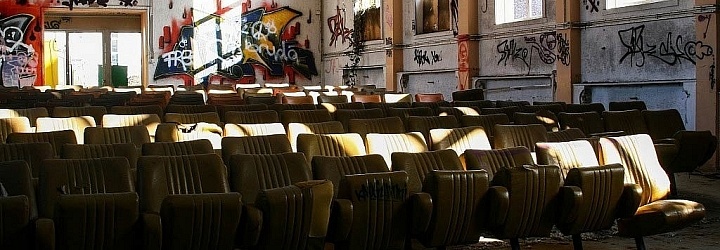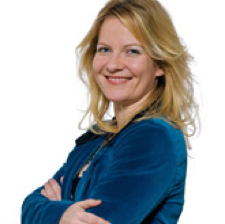Jutta Brendemuehl is the Goethe-Institut Toronto’s Program Curator. Jutta holds an M.A. in English literature and contemporary history. She is lucky to love what she does: arts and cultural programming across the genres and through a global lens. Over the past 15 years, she has worked with Bernardo Bertolucci, Robert Rauschenberg, Wim Wenders, Pina Bausch, and other luminaries. She is one of the Directors of the European Union Film Festival Toronto and its programmer of German films.
Visit the Goethe-Institut Toronto film page for more information.
In September 2015, the Toronto International Film Festival is screening 8 German films and 24 German co-productions with a line-up that includes legendary film director Wim Wenders and a host of newcomers likely not yet well known to North American audiences. As Program Curator at the Goethe-Institut Toronto, Jutta Brendemuehl works closely with TIFF and a host of other cultural organizations to bring German film culture to the city, not only during film festival season, but throughout the year. Kultur360 spoke to Jutta to ask her about recent German productions, the impact of Wim Wenders’ cinematic legacy, and her insights into the larger film festival landscape.
In general, North American audiences are probably most familiar with German films that deal with 20th-century history, in particular films about WWII and Nazi Germany or the GDR, such as “The Downfall” or “The Lives of Others”, for example. TIFF audiences will have the opportunity to see this kind of historical film this year with Lars Kraume’s “The People vs. Fritz Bauer”, which depicts the obstacles state attorney general Bauer faced in his attempts to bring Nazi war criminals to trial in the 1950s. Do you think this kind of programming reinforces North American stereotypes about German culture?
I am just coming out of Laszlo Nemes’ Hungarian Cannes winner “Son of Saul”, set in Auschwitz in 1944. Nearly unbearable and absolutely necessary. Our last few Goethe Director’s Talks during TIFF can all be placed in one timeline in the middle of the last century: Margarethe von Trotta’s “Hannah Arendt” tackled the Eichmann trials that Fritz Bauer does. Christian Petzold’s huge TIFF14 success “Phoenix” asked a question we hadn’t really asked ourselves, at least on the screen, for decades: What was it like for Holocaust survivors immediately after their rescue, to return to a home that was not home anymore? Petzold will continue in that vein. I saw Atom Egoyan’s “Remember” a few weeks ago, which drags the repercussions of the Holocaust into the present and looks at the witnesses’ last stage of life. And going back a few years, I would even place Chris Kraus’ World War I drama “Poll Diaries” (TIFF10) in that timeline, as a precursor to those later events and films. Even this year’s German Oscar contender “Labyrinth of Lies” (TIFF14) also revolves around the Fritz Bauer theme.
Some history-referencing works do nothing but reinforce blunt stereotypes, some add nothing new to our understanding of how 20th century Europe impacted the world through wars and dictatorships. But some can shape your emotional and intellectual understanding like no other art form or news report or history lesson can. I am thinking here of Petzold with “Phoenix” or “Yella”, of Andreas Dresen dealing with the demise of the GDR in “Silent Country” or “Grill Point”. I am just waiting for a German “Inglourious Basterds” to switch it up a bit. Although we might just have had that with “Heil”, which I haven’t seen yet.
A Germany that deals with its demons-and learns.
Not all of the German films at TIFF deal with the political issues of the Second World War and a divided Germany. How do the German selections this year offer a broader perspective on the German film landscape? Is this year’s selection representative of any new trends in German film?
Eight German films and 24 co-productions – or 12 so-called “majority films” if you like – do not make a representative slice of German cinema of course. But I did notice that genre films are creeping in here, something I have been noticing coming out of Germany for a while and being increasingly recognized, for example arthouse director Dominik Graf’s passion for crime with major TV mini-series or the German Film Award-winning Western “The Dark Valley”. This year’s TIFF horror selection “Der Nachtmahr” fits in that list. One could also count “Victoria” among them since director Sebastian Schipper claims it’s not a film, it’s a bank robbery in progress. Biopics are universally popular these days, in Germany as well, which leads us back to Fritz Bauer or Hannah Arendt as well.
Younger indie film, often out of the strong German academies — where my big hope for the future lies –, is less present this year than previously. Germany is also a strong player when it comes to international co-productions and that certainly shows at TIFF each year, see the ratio above. That leads us back to the eternal question of “What Is A German Film?”, a discussion that just had the Academy disqualify the biggest German film of 2015 for not being German enough – “Victoria”, which has a Special Presentation at TIFF as a German film by a German filmmaker, set in Berlin.
What sort of significance does TIFF hold for German filmmakers and how does it fit within the larger festival circuit? Does anything distinguish it from other festivals?
Being invited to TIFF is perceived as an honour and a boost for German filmmakers I believe (and a chance to sell or launch in the North American market). Would “Labyrinth of Lies” now be in the Oscar pre-race if it hadn’t played so positively in Toronto a year ago? Even an accomplished and much feted veteran like Edgar Reitz was rightly proud of showing his final 3-hour black-and-white “Heimat” film here, being recognized on a continent with a very different film culture and language than the one he comes out of. For younger or experimental filmmakers, making it to Wavelength or Contemporary World Cinema certainly puts you on the map and creates some attention inside and outside of Europe.
Comparative festival studies seem to be the new “it” sport. I hope the “my festival is better than yours” contest will blow over again soon, I want to get back to films. I find myself at parties with busy industry people who barely know whether they are in Venice, Telluride, Toronto or New York, all lined up like pearls on a string within six weeks or so — or even overlap. I am still partial to the well-oiled gigantic affair that is the Berlinale, mostly for its political and aesthetic guts, its risk-taking and very frank conversations. I would have loved to go to Venice and Locarno this year, their programs looked great (actual delivery and realization and reception are a whole other story).
I wonder where TIFF is heading, it’s interesting times, they have been trying to reposition themselves in this game. It has certainly been getting bigger, getting more industry-oriented and -driven, also more mainstream. But an international film festival cannot run on Oscar buzz and Hollywood red carpets alone. TIFF has grown enough for everyone to make it what you want it to be, from Midnight Madness if you’re into horror to the internationally outstanding Wavelength program if you like arthouse fare. The Middle Eastern programming has a great reputation and very committed programmers, I wish I had more time to spend with these films. The City to City focus is a universally attractive and smart sidebar. I have high hopes for the new Platform section for “artistically ambitious international films”, in its inaugural year programming “Sky”, with advance praise for Diane Krueger, and the much-anticipated “High-Rise”.
Perception is what counts.
Who are some of the emerging talents in German film that audiences should watch for?
At TIFF14, my colleagues at German Films were smart enough to feature the who’s who of younger German actors, who were here in force: Tom Schilling (“Oh Boy”), Daniel Brühl (this year with “Colonia”), Alexander Fehling (“Labyrinth of Lies”), and half a dozen others. 2015 seemed to start out like a big year for major German directors, but not all of them delivered.
Looking beyond TIFF, some younger directors I am curious about and have been keeping an eye on are David Wendt, Dietrich Brueggemann, Bettina Blümner, Johannes Naber, Jan Ole Gerster, Maria Speth among others. With docs it’s sometimes outstanding production houses to watch, like Gebrueder Beetz. I wish I would list more women here.
Film is fast, so all of the above is subject to change. I am planning on going to the Hof International Film Festival and Dok Leipzig next year, so check back with me then. That’s the best way to find your own ones-to-watch by the way: attending festivals, watching films and more films and then parse them, or catching up on Festivalscope or Alleskino web platforms. Alas something working in Germany or Europe doesn’t mean it automatically translates internationally. So through my specific glasses of presenting German film abroad, I have to put that filter on my lens as well, besides quality and relevance and freshness and many intangibles.
The Goethe-Institut and TIFF are feting Wim Wenders at this year’s festival. What do you think will be his most lasting influence on cinema, both in Germany and further afield?
I think people are so awed by one of the last New German Cinema idols that they overlook how young Wenders has remained as an artist, at 70. He quietly runs his own music label, has just finished shooting with Nick Cave again in France. And let’s not forget that it is Wenders and a handful of other international greats who are doggedly pushing the artistic envelope on 3D.
I admire how Wim is very consciously shaping his legacy with his new Dusseldorf foundation, from bringing home the rights to his oeuvre to promoting the next generation of film artists with a development stipend. At the end of the day, nobody sees and visually defines and humanizes the urban landscape like he does. I cannot set foot on Berlin’s Potsdamer Platz without catching a glimpse of Bruno Ganz’ angel somewhere, or take the elevated train in Wuppertal without looking around for Pina’s dancers to jump up in bunny costumes. And he put us on that never-ending road, driving from “Alice in the Cities” to “Every Thing Will Be Fine”. When he’s good, he’s so good, enveloping you in an atmosphere, an impression. I can’t wait for next year for his new Peter Handke adaptation, “Les Beaux Jours d’Aranjuez”.
What are some of the films you are particularly looking forward to at this year’s festival?
Gladly, I have seen many of the German films already, so that leaves room in my schedule to see what I need to see to get a sense of what is going on in the larger context of global film, what the themes, preoccupations, aesthetics, innovations are. I think one cannot miss a film like “Dheepan” as one commentary on where Europe is coming from in its global engagement and where Europe and for that matter the western world is going right now with the wave of refugees coming in.
Regrets I know I will have at the end of the festival are that I won’t get to see as many of the featured films about my favourite city and favourite other film culture, London and the UK.
Nobody sees and visually defines and humanizes the urban landscape like Wim Wenders.
And then there is everything around the films that is important to my larger cross-genre programming work. I will take time to see TIFF’s visual arts programming that has been folded into Wavelength along the idea of the Berlinale’s Forum and Forum Expanded. BlogTO listed our own in-house Wenders show under “5 can’t miss events during TIFF”, so I will have to facilitate that to our audiences (and during TIFF that means a lot of interested Americans). We do an industry breakfast for the German delegates and talent at TIFF each year that keeps me busy, and I attend other TIFF and partner parties. It’s important to connect and exchange experiences with colleagues and make new contacts each year.
But I am trying really hard to fend off the maelstrom of FOMO and to find an hour here and there for reflection and exchange and conversation, even if it’s at 2am. The artists appreciate that as well, as TIFF veteran and rare German Oscar winner Caroline Link recently told me: “A very special moment for me during TIFF 2013 was my talk at the Goethe-Institut with Canadian filmmaker Ruba Nadda. As a filmmaker you rarely have the chance to enter an intense conversation about your work, your approach, your ideas and philosophy. Especially not with other female directors. Goethe gave us the space and the time to discuss filmmaking and directing as women directors.” This year, we are doing a talk with Lars Kraume on “Fritz Bauer”.
In your position as Program Curator at the Goethe-Institut you have had the opportunity to meet with an impressive list of individuals in the film industry – from world-renowned to up-and-coming directors and actors. What are some of the memories that most stand out for you?
Last year I presented a focus on the fall of the Wall. After showing “Wings of Desire”, an audience member came up to me and hugged me, close to tears, thanking me a dozen times for reminding him of the magical imagery of the film and reshaping his picture of Berlin when it first came out and now. That’s when you go home content.
I won’t lie, there’s nothing not spectacular about chatting with Sebastian Koch about his on- and off-set experiences with Bruce Willis. But what remains are the little encounters and anecdotes, and not always the easy ones. Sitting in a hotel room to interview Werner Herzog, who threatens to leave after five minutes if you keep quizzing him on working in other cultures (we really bonded over the next 2 hours though, to this day!). Sitting behind Bruno Ganz as on-screen Hitler and the late über-producer Bernd Eichinger during the TIFF “Downfall” gala ten years ago, nervous about the audience reaction (which was overwhelmingly enthusiastic). Or Wim Wenders nodding appreciatively for a while and then saying “fabulous” to our current show out of his personal archive.
At the end of the day, I always come back to single wondrous films though, like Sebastian Lelio’s Berlinale Silver Bear winner “Gloria”, which has become my melancholic companion.


